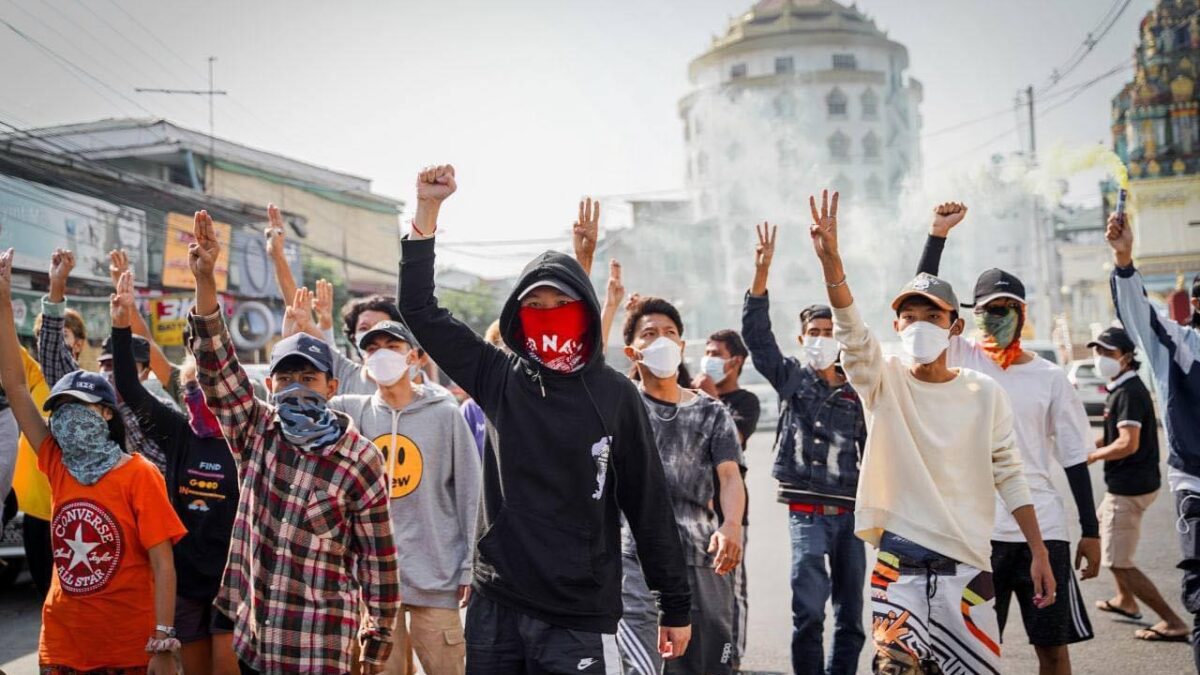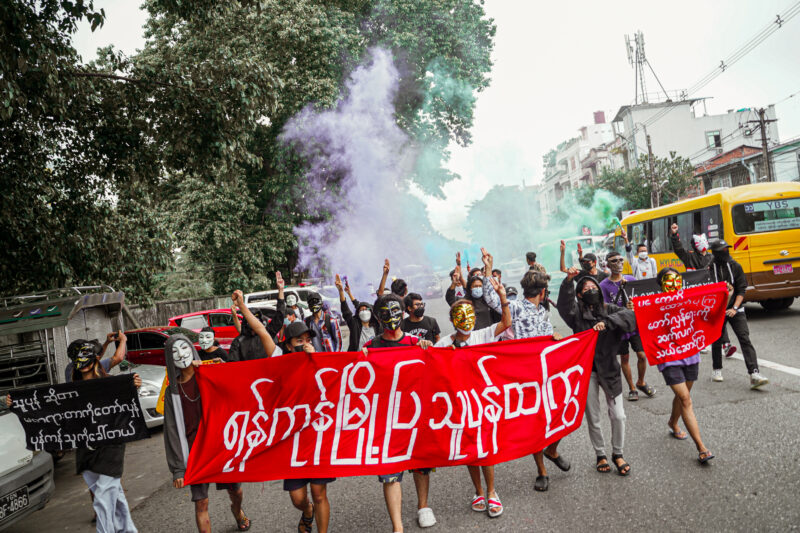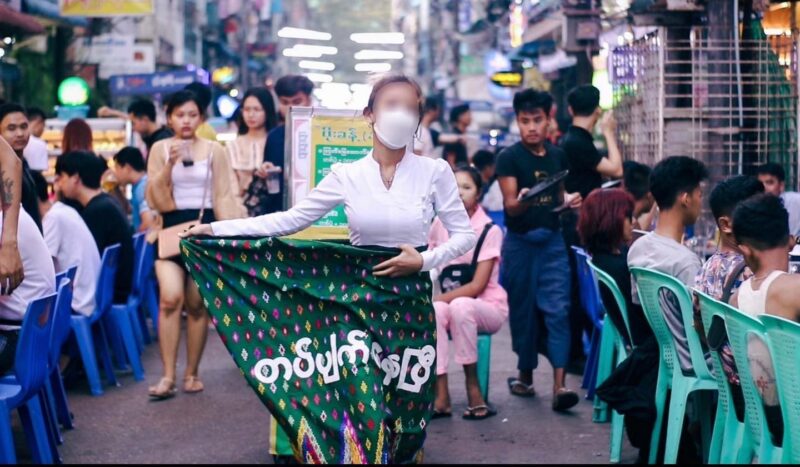
Youth activists stage a flash mob in protest against the continuing junta rule. Photo from Yangon Revolution Force, used with permission
The pro-democracy movement in Myanmar continues to challenge the junta which grabbed power in a coup in February 2021. The opposition government, ethnic armed groups, urban activists, and exiled media are all demanding the end of the military dictatorship, restoring civilian leadership, and reviving the nation’s transition to democratic rule.
Massive rallies opposed the junta and a civil disobedience movement emerged against the military dictatorship immediately after the coup. The junta responded by violently suppressing protest actions, revoking the licenses of independent media outlets, and designating the opposition government as a terrorist group. A systematic crackdown on dissent targeted youth activists, opposition leaders, journalists, and ordinary citizens suspected of supporting the pro-democracy movement.
Despite the mass arrests and violence, opposition against the junta continues to garner public support as seen in the coordinated “silent strike” across the country. Activists either joined the armed resistance in rural communities or sustained the opposition in urban centers.
READ MORE: Myanmar's Spring Revolution
Through the help of a solidarity network, Global Voices interviewed the Yangon Revolution Force (YRF) and the Artists Collective about the status and prospect of the urban struggle against the junta.
After the violent dispersal of rallies, activists organized flash mobs to evade security forces while spreading the message of the resistance. Oakkar, a spokesperson of YRF, explained how flash mobs are organized.
Our flash mobs initially included 30–40 people, but when crackdowns became lethal, we downsized to groups of 10–20. Eventually, most of us were apprehended, and we had to operate in even smaller units.
The Artists Collective, a group of rebel artists, affirmed the value of flash mobs in the overall resistance.
Soft strikes and flash mobs are highly effective. We must always show the fascists that they're not in control. We believe these campaigns are gaining significance over time.
Images and videos of flash mobs often go viral reflecting the online support of Myanmar internet users. Oakkar shared how activists are maximizing multiple platforms to reach more people:
When the junta began brutally cracking down on peaceful protests and restricting internet access, we started organizing flash mobs. We didn't expect our campaigns to go viral or receive applause; we simply acted as necessary and relayed information to the media. The public's support has given us the strength to continue. We've also leveraged platforms like Telegram and Instagram. It's risky for people to engage with our Facebook posts due to potential repercussions, but we continue innovating ways to demonstrate that the junta cannot govern.

A flash mob against the junta. The banner's message: “Rebels of Urban Yangon.” Yangon is the largest urban center in Myanmar. Photo from Yangon Revolution Force, used with permission
Another innovative protest is the Longyi campaign which involves the posting of protest messages in Myanmar’s traditional attire.
The Longyi campaign is a source of pride for us. Longyi is our traditional attire, a wrap-around skirt worn by both men and women. We wrote revolutionary messages on the fabric that would become visible when adjusting the Longyi in the crowd. The campaign received significant praise and global support, marking a proud moment for us.
Another risky form of protest is talking to strangers in the streets about the anti-junta campaign.
Another risky campaign involved our members approaching random people on the street to discuss the junta's upcoming sham election. This task was dangerous; if the people we approached were spies or junta supporters, we risked imprisonment. But we managed to execute it successfully.

The message in the longyi: “Junta is failing.” Photo from the Yangon Revolution Force, used with permission
Oakkar narrated the difficulties they face in waging guerilla tactics in urban centers:
It's extremely risky for our comrades to operate in Yangon. Increased patrolling, more spies, and advanced surveillance make it difficult and resource-intensive to operate in the city. Despite the ruined economy, locals are willing to rent safe houses to our members for a higher price. Operations cost is high due to the necessity of employing several scouts for safety.
The Artists Collective underscored the role of collaboration among different members of the pro-democracy movement:
As long as our comrades, who are in riskier situations, are willing to revolt, we're ready to help in any way to ensure the success of this spring revolution. For instance, during Daw Aung San Suu Kyi's birthday, we stayed up all night on a video call to guide our comrades in Yangon on how to draw the banner.
Oakkar highlighted the sacrifices of those who decided to join the anti-junta resistance:
Our members have had to make tremendous sacrifices. Our security is a constant worry, day and night. Many of us are unable to sleep peacefully, as the threat of midnight raids looms large. One of the most heart-wrenching realities is being cut off from our families. Additionally, unlike most young adults in their 20s, we don't have the luxury of enjoying regular pastimes and leisure activities. Our commitment to this cause, however, makes these sacrifices bearable.
He also shared an appeal to the international community:
We understand that everyone has their own responsibilities and tasks. However, we would greatly appreciate it if they could provide donations to support war victims fleeing to the borders, assist immigrants, or offer free online education to students supporting the Civil Disobedience Movement

A flash mob banner: “May the daughter of U Aung San be healthy.” Aung San is a Burmese nationalist leader. His daughter is Aung San Suu Kyi, the Nobel laureate and democratically-elected leader of Myanmar who is currently detained by the junta. Photo from Yangon Revolution Force, used with permission.
The Artists Collective cited the contribution of artists in the pro-democracy movement:
As artists, we knew we could contribute by creating artworks to support the revolution. The fact that people are printing our artwork or using the digital versions online brings us immense satisfaction. We support the revolution through our art. Working together, we create banners, convey important messages, and assist with designs. Seeing our art pieces printed, displayed in marches, and online during flash events fills us with pride.
The group is confident that the revolution against the junta will lead to success:
We've seen a significant number of women and people of diverse sexual orientations and identities in deadly combat. This unique situation has brought people of different ages together to fight against the regime that has systematically oppressed our nation for 70 years. We believe the world will witness the establishment of a new federal democratic order in our country.







